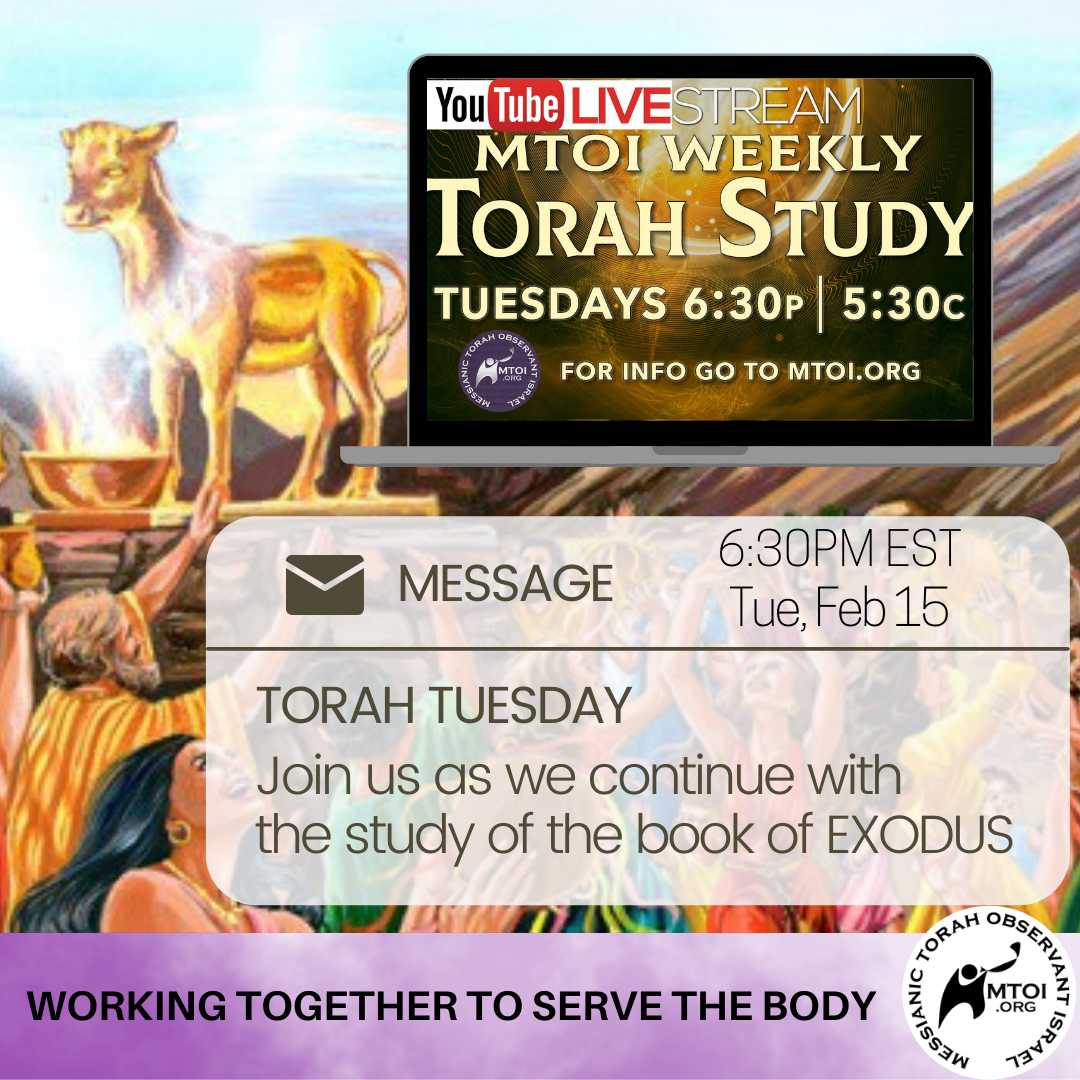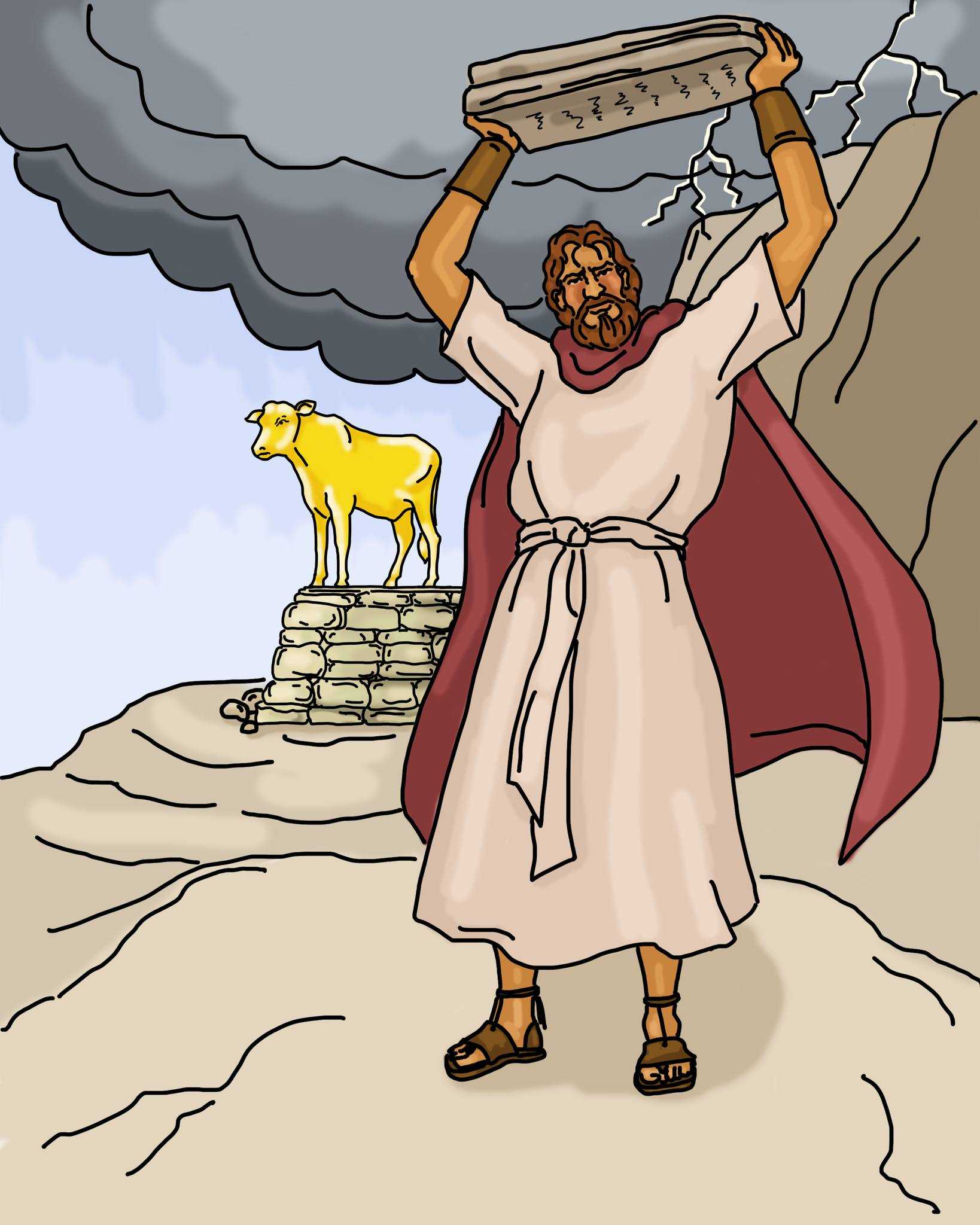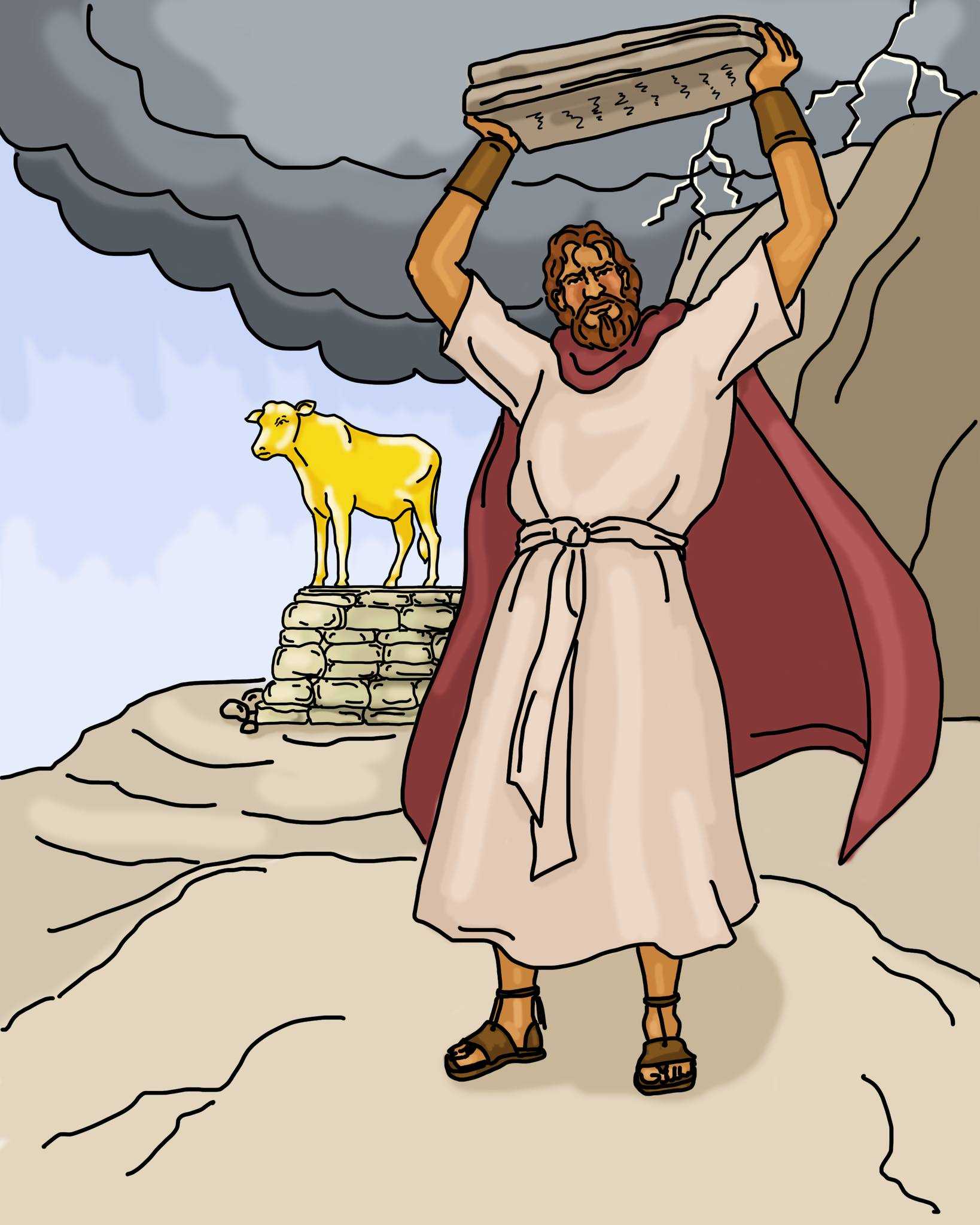Watch
Events
Articles
Market
More
Link to service - https://youtu.be/CFiYj_zNsZ4
Welcome to our weekly Torah Study, aka Torah Tuesdays. This week's Parsha is Ki Tisa, Exodus 30:11 - 34:35
Don't miss out on new teachings every week. Please click on the "LIKE" button if this video has been a blessing to you.
For more information about MTOI (Messianic Torah Observant Israel), visit our website at https://mtoi.org.
Join us on Social media!
Like us on Facebook: https://www.facebook.com/mtoiworldwide
Follow us on Instagram: https://www.instagram.com/mtoiworldwide/
Follow us on Twitter: https://twitter.com/mtoiworldwide
Join us on The Torah Network: https://social.ttn.place/mtoiworldwide
Join us on Telegram: https://t.me/mtoiworldwide
We are located in Cleveland TN. If you would like to know more about us, we would love to hear from you! Feel free to visit us on our website https://mtoi.org, email us at admin@mtoi.org or call us at 423-250-3020.
.
.
.
#kitisa #torahtuesday #torahstudy #Shemot #Exodus #Torah #Yahweh #Yeshua #Elohim #Messiah #messianic #torahobservant #mtoiworldwide #clevelandtn




Shalom! Take a look at our 2 lessons we offer this week for parsha Ki Tissa. In lesson 21.1 called "The Golden Calf," we will be concluding the story of Mosheh receiving the two tablets of stone of the Witness to bring to the people and their lack of faith in asking Aharon to make them a mighty one.
In 21.2 called "Blueprints for the Courtyard," we will continue learning about the Dwelling Place, and will now cover the making of the courtyard and its furnishings—the bronze altar, its utensils and the bronze wash basin. In order to get the most complete picture of the courtyard, this lesson will include verses from other parshas as well.
You can find these lessons as well as all our lessons at: https://ymtoi.org/
We hope that Parsha Pearls blesses your home and remember to share any comments or photos with us on our YMTOI Facebook page or email us at: parshapearls@mtoi.org. We love to hear from our followers!
.
.
.
#kitisa #torah #yahweh #yeshua #elohim #messiah #messianic #torahobservant #mtoiworldwide #clevelandtn #ymtoi




Shalom! Take a look at our 2 lessons we offer this week for parsha Ki Tissa. In lesson 21.1 called "The Golden Calf," we will be concluding the story of Mosheh receiving the two tablets of stone of the Witness to bring to the people and their lack of faith in asking Aharon to make them a mighty one.
In 21.2 called "Blueprints for the Courtyard," we will continue learning about the Dwelling Place, and will now cover the making of the courtyard and its furnishings—the bronze altar, its utensils and the bronze wash basin. In order to get the most complete picture of the courtyard, this lesson will include verses from other parshas as well.
You can find these lessons as well as all our lessons at: https://ymtoi.org/
We hope that Parsha Pearls blesses your home and remember to share any comments or photos with us on our YMTOI Facebook page or email us at: parshapearls@mtoi.org. We love to hear from our followers!
.
.
.
#kitisa #torah #yahweh #yeshua #elohim #messiah #messianic #torahobservant #mtoiworldwide #clevelandtn #ymtoi




Thought for Today: Tuesday February 15:
Know that YHVH is pleased with you as His child. Allow yourself to become fully aware of His pleasures shining upon you. You do not have to perform well in order to receive His Love. In fact, a performance focus will pull you away from Him. This can be a subtle form of idolatry, worshipping your own good works. It can also be a source of deep discouragement when your works don’t measure up to expectations. Shift your focus from your performance to YHVH’s radiant Presence. The Light of His Love shine on you continually, regardless of your feelings or behaviour. Your responsibility is to be receptive to this unconditional Love. Thankfulness and trust are your primary receptors. Thank YHVH for everything: trust in Him at all times. These simple disciplines will keep you open to His Loving Presence.



Were the ceremonial laws of Moses ultimately abrogated when the Temple was destroyed in AD 70? The Apostles didn't think so.
https://www.americantorah.com/....2022/02/14/the-law-e




Stand up and fight for truth!
#contendearnestly #faith #wwjd #seekyefirst #scripture #christian #believer #truth #bookofjude #bible #torah #torahobservant #cornerfringe #worship #sabbath #shofar



My bookstore on PangoBooks | handle: @torahfamilyliving | https://pangobooks.com/bookstore/torahfamilyliving
#shopfamilyfirst



In my distress I called upon YHVH; to my God I called. From his temple he heard my voice, and my cry came to his ears. Then the earth reeled and rocked; the foundations of the heavens trembled and quaked, because he was angry...
2 Samuel 22:7-8
God gave #torah not just to protect us from the world and ourselves, but even from Him. It's a safety manual. It teaches the fear of God and how to approach him safely. A lack of fear of the Almighty is a form of insanity. Likewise, all the world ought to fear offending God's anointed and any others who have a special place in God's heart.



Do you have a Bible Bully?
Even Moses was bullied and many others
Most people think being bullied comes from someone outside their faith. And that does happen. People who don't know the Bible nor understand it. You give them a pass even come back for more if it wins the day! And in my life, I have encountered many of these. I have yet to meet anyone who really loves the LORD and wants to get others to know HIM that has NOT had this happen to them. We all know there are many reasons people DO not have a spiritual life and they don't want one, even if they live under Satan's spiritual control...
YOU'RE in GOOD COMPANY if this type of bullying has happened to YOU!
There is another type of Bible Bully. You will find these people in churches or places of worship and yes on the internet. They know more than anyone. In their eyes, most people without formal education are well not up to the task of really knowing their Bible correctly. Their form of teaching is the ONLY WAY. Paul ran into this type of Bullying. They love titles and often are willing and waiting to give you what that title is theirs and keep using it to put others in their place. So you know they are smarter than you. The company you keep here is with Peter, John, and Paul. Yes, even Moses. Every person you know now and in history, both women and the men who have served the LORD has had their bullying and a LOT of it and it is recorded in the Bible and history books and in your life story as well.
Peter Acts 4:13
Now when they saw the boldness of Peter and John and perceived that they were unlearned and ignorant men, they marveled; and they took knowledge of them, that they had been with Jesus.
UNLEARNED vs experts
Where Paul who knew his stuff and was VERY LEARNED was told it was his timing and how he did and said things that weren't correct or clear. He didn't fit the part of what the different churches had seen of him or heard. They look down at Paul regardless of his KNOWLEDGE.
You are in GOOD COMPANY if you are a smart person you still will get Bully never good enough because you have the love for the LORD. Modern example: Dr. James Tour laugh at for his faith in Jesus The Messiah. Awards: Oesper Award (2021), Centenary Prize (2020), Feynman Prize in Nanotechnology (2008)
When it comes to doing the LORD's work, teaching, or witnessing there are no professionals.
Running into a Bible Bully is power for the course. What course? The Course of action. Remember it is the Book of Acts not the Book of Reacts. BE BOLD. That book is still being written in the Kingdom of GOD.
The LORD will overtake the bullies wherever they attack. Just a thought.




Gary Bishop
Delete Comment
Are you sure that you want to delete this comment ?